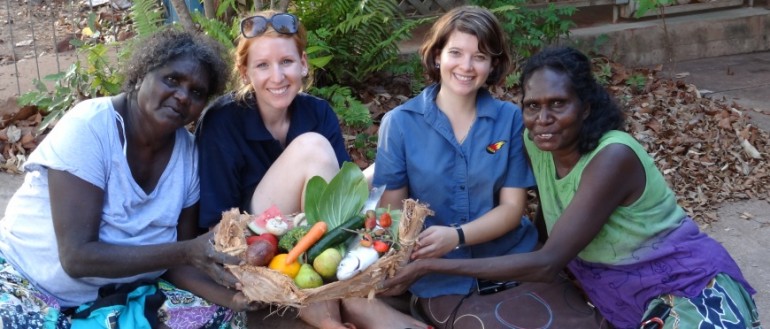Can you hear me, baby?
When two young nurses swapped the corridors of Darwin Royal Hospital for life as researchers, together they took steps towards finding enduring solutions for people in Aboriginal communities.
It's wet season in the Northern Territory and nurses Zeina Hayes and Nicole Wienert peer from the windows of their tiny plane.
As the Tiwi Islands creep into view 90km north of Darwin, the sea forks into spearmint-coloured plains. Vast sweeps of ferns fan out across the islands, and from the air, fronds look like the tops of household feather dusters.
Luckily there’s no sign of Hector just yet. It’s too early in the day. (Hector’s the name given to the type of thundercloud that forms most afternoons over the Tiwis). For this fact, the nurses breathe a sigh of relief. “It can be a bit freaky flying the wet season,” says Nicole.
After the landing, they unpack their equipment, are met by a local clinic nurse, and begin the work of finding local mums – participants in their trial of vaccines aimed at preventing the spread of the pneumococcal bacteria, which commonly triggers hearing damage.
“We meet mums when they’re pregnant, or when they’ve recently given birth. We then see the baby almost every month until they’re seven months old,” explains Nicole.
“Often finding mums is the hard part. Families will say, ‘She’s not here! She’s at the shops! She’s gone to Darwin!’ But we’re always happy to come back at a better time and drive people to the clinic. We get to know the mothers, which is one of the nicest parts of the job. It’s not just a case of coming in once and leaving. They recognise us in the street.”
After performing immunisations, the nurses check babies’ weight, as well as their ears and skin. They also field questions from new mums, such as when to start on solids, and whether certain behaviours are ‘normal’.
As evening descends over the islands, the nurses head out for walk and later play pool at the local club.
“The Tiwis are great,” says Zeina. “You can go out at night and everyone comes out in the streets – especially when the Tiwi Bombers are training. Everyone flocks down the oval to watch footy.
“The locals are quite used to Menzies people being around, too. They’ll say: ‘Are you the Menzies mob? Are you with the ear team?’”
The nurses’ wider team has visited the Tiwis regularly since 2008 for its studies fuelling the fight against chronic middle ear infections, known scientifically as otitis media.
In remote parts of the Northern Territory and Western Australia, occurrence rates of the disease reach 20 per cent.
“As far as we know, Australia is the worst affected area in the world,” says Menzies hearing specialist Dr Peter Morris. “According to the World Health Organisation, if more than four per cent of children within a population have this condition, it’s considered a public health emergency.”
The worst form of otitis media ruptures eardrums, in turn impairing speech and educational development.
“Normally we hear sounds at around 15 decibels. Most kids with the condition have roughly a 30-decibel hearing loss. They hear conversation but it’s muffled. Shouting sounds like a whisper,” Morris says.
It’s hoped the Menzies-delivered vaccines in Tiwis will dramatically reduce instances of the disease; while at the same delivering information to governments, physicians and policy makers as to which vaccines are most effective.
“Our work is definitely having an impact,” says Zeina. “For me, working with otitis media is a hugely positive thing as the condition really affects Aboriginal children and decreases their quality of life.
“In the overall scheme this may seem like a small piece of the pie but it’s the commitment of the researchers, nurses, doctors and Aboriginal health workers that will make all the difference – and ultimately help in closing the gap.”
For Zeina, the idea of ‘closing the gap’ begins with acknowledging the stark differences between the health statuses of Indigenous and non-Indigenous Australians. From there, she believes in setting measurable health goals.
It’s little surprise the 24-year-old has her sights fixed on continuing work in the public health domain. She’s currently studying for a Graduate Diploma in Public Health through Menzies.
Twenty-six-year-old Nicole, however, may return to clinical work; though for now she’s happy with the research life. “It’s renewed my love for nursing,” she says.
“We’re travelling out to communities and working with families. It’s such a different thing to treating acute illness. We’re promoting preventative health rather than trying to fix people as they come through our doors.”
Before calling it a night, the nurses glance out upon the dimly lit township. Families, kids and dogs criss-cross the street. The scent of rain on fresh earth hovers in the air.
“You want to know what I’ve noticed about these communities more and more?” asks Nicole.
“How much the people here love their kids,” she says. “You see it on the faces of the mums and dads. If there’s a new baby born people will run up and kiss him or her. Kids are a big deal here. They’re very special. They’re very loved.”

